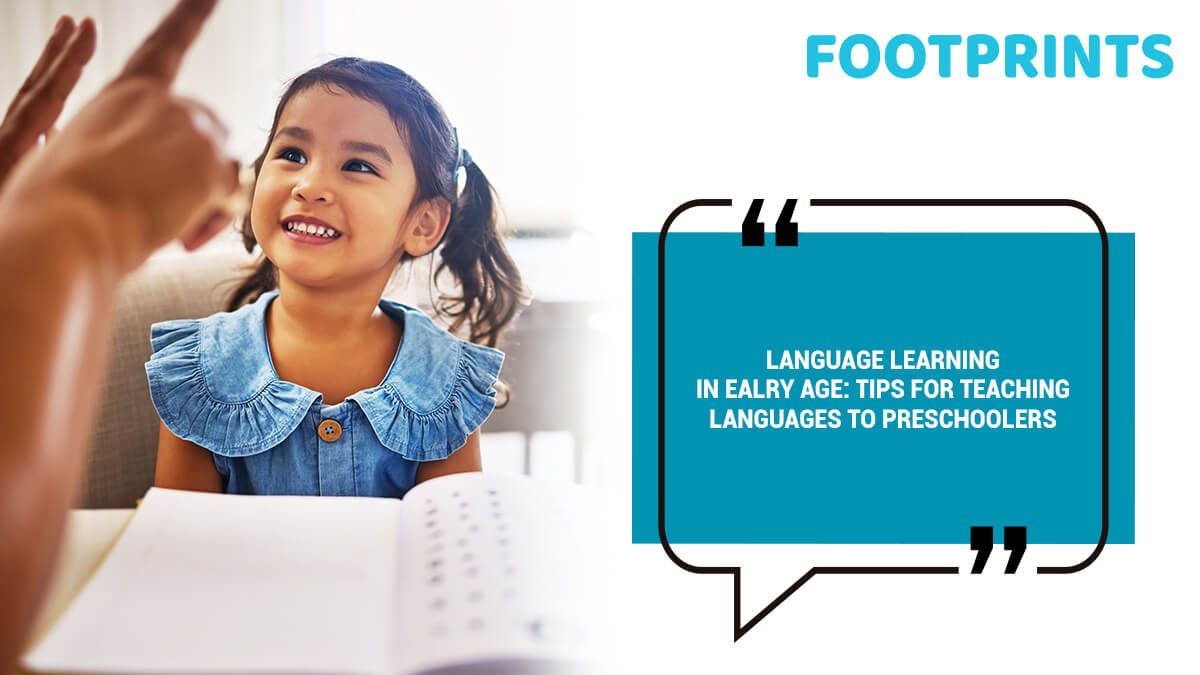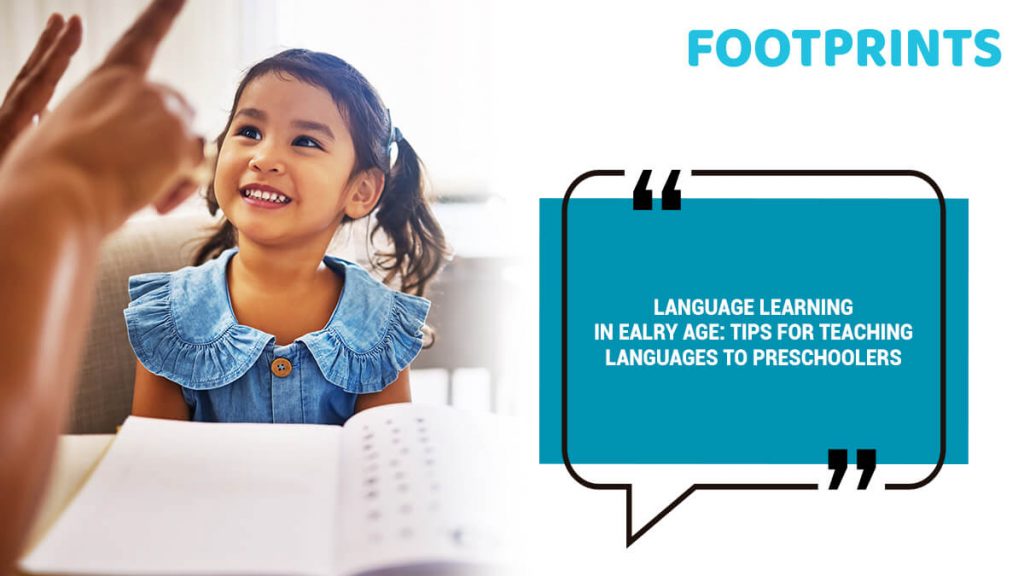
Language is something we can’t ever live without. But language is also a very prominent topic of discussion, especially at an early age. It is an important topic that specifically holds immense significance in the overall development of the child. In fact, we all parents would agree to this fact that this is one of the reasons why we actually put our children in a preschool center. The ability to acquire knowledge and language skills at a young age is quite remarkable, and it presents parents with opportunities that parents and educators can utilize to foster the growth of children. In this blog, we will be digging deep into the world of language learning at an early age and will be uncovering its importance, valuable tips, and strategies that can help our children in their language learning journey. Join us as we delve into the fascinating world of early language acquisition and learn practical strategies for fostering young children’s linguistic growth. First, let’s discuss the importance of language learning for preschoolers.
Importance of Language Learning For Preschoolers
As we said earlier also, one of the reasons why parents enroll their children in a play school is because their child develops language skills. This is because the importance of language learning for preschoolers specifically is quite well established. It helps lay a strong foundation that prepares them for future academic success, as well as helps in overall development. According to many research studies, the young years of children’s life are quite resourceful.
They have a remarkable ability to absorb new information and acquire language skills easily. They acquire the ability to communicate successfully as well as cognitive, social, and cultural awareness through being exposed to a range of languages. Additionally, learning a new language improves a person’s ability to think critically, be creative, and solve problems. It nurtures a lifetime love of learning and encourages empathy, tolerance, and understanding of other cultures. In the end, putting money into language development during the preschool years paves the way for a successful future for children.

Tips For Teaching Language To Preschoolers
1. Create an Immersive Language Environment
Creating an immersive language environment is considered one of the most effective methods to teach language to preschoolers. By surrounding the child with the target language as much as possible, it enhances their language learning experience. Engaging in conversations, singing songs, telling stories, and labeling objects around the house in the target language are all effective ways to achieve this immersion. The more exposure a child has to the language, the quicker and more proficiently they will grasp it.
2. Use Visual Aids and Props
Another way to easily make young children easily grasp language skills is by using visual aids and props in the learning methods. This method is often used by many play schools for teaching preschoolers language skills. You can incorporate flashcards, hand puppets, and colorful pictures in the learning methods and activities to make children learn language playfully. This also creates a fun and engaging environment for young learners. For example, when you teach colors to children, you most probably show them pictures of different elements and let them identify the colors. This thing not only captures their attention but also improves their comprehension skills and retention of language. All these visual stimuli activities help children learn language effortlessly during their preschool journey.
3. Incorporate Music and Rhymes
Music and rhymes have come a long way in teaching children umpteen number of things, and language comes as no different learning. When educators or parents incorporate music and rhymes in language learning methods, it can greatly benefit children. We all know how much children love music, and this is why teaching them language through music helps make the process interactive and fun. You can sing them new songs, recite them new rhymes, and that too in the target language. With these activities in regular intervals, children learn pronunciation, rhythm skills, and intonation. The engaging and enjoyable aspect of the learning process is further enhanced by including actions and gestures in these activities. Young language learners benefit greatly from the use of music and rhymes as language acquisition techniques.
4. Play Language-Based Games
Play is a great way to get young children interested in language learning. Children can learn while having fun by introducing language-based games that concentrate on vocabulary growth, such as memory matching games or playing ‘I Spy’ with objects in the area. Playtime for children that includes language is not only more fun for them but also more natural. This interactive method promotes engagement and gives younger ones an enjoyable, immersive way to learn language skills.
5. Read Aloud and Storytelling
You might have seen teachers reading aloud and conducting storytelling activities. This is a very important activity in the eyes of many educators. By reading aloud, children actually get exposure to a new vocabulary of words and linguistic skills. This is because, during these reading-aloud and storytelling activities, teachers use age-appropriate books in the target language and help them read them frequently. This develops their language skills, but not just that, it also helps their imagination skills and storytelling abilities. As these activities build confidence in children, they themselves take the initiative to take part in competitions, storytelling activities, and more. This collaborative method not just fosters their language skills but also builds great self-expression and creativity skills.
6. Keep Language Learning Sessions Short and Fun
Because preschoolers have limited attention spans, it is essential to plan engaging, quick language acquisition sessions. It is advised to divide teachings into smaller portions to interest these young learners better. This keeps them engaged and keeps them from being too overwhelmed. Additionally, children can have a more pleasurable and engaging learning experience by adding a range of activities like games, songs, and interactive conversations. Children are more likely to actively participate and remember what they have learned in a fun and engaging environment.
7. Encourage Language Practice in Everyday Situations
Giving children the chance to practice their language skills in natural settings is critical during the formative years of preschool. Preschoolers’ language abilities are improved when they are encouraged to utilize short words, whether playing with friends, eating, or participating in other activities. Children can develop confidence and fluency by creating a safe setting where they can experiment with language without worrying about making mistakes. Preschoolers can improve their language skills and lay a solid basis for future learning through these common interactions.
8. Use Technology and Educational Apps
Preschoolers may now learn languages with the help of technology and educational apps, thanks to the digital era. Educators now have access to a wide choice of interactive applications and websites that offer a variety of language learning exercises that are specially created for young children. It’s crucial to pick age-appropriate apps that support your educational objectives and each child’s specific learning pace. These tools offer toddlers a customizable and individualized learning environment while also increasing language learning’s interest and enjoyment factor.
Conclusion:
In conclusion, we can say that teaching language to young children is a very exciting endeavor. We have to make sure that the language learning environment comprises all these suggestions that we mentioned above to make children’s language skills effortless. Preschoolers can start a lifetime of language discovery and communication by using this practical advice and techniques, laying a solid basis for their future language development.
Aditya brings over ten years of expertise as a Senior Marketing Strategist. He’s an expert at developing captivating marketing tactics that regularly provide excellent outcomes. His innovative strategies have demonstrated a track record of increasing organizational reach and engagement, showcasing his extensive knowledge of the contemporary marketing landscape.



